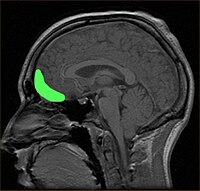
Photo from wikipedia
Introduction Intrusive traumatic reminiscences are among the most distressing and salient characteristics of post-traumatic stress disorder (PTSD). Associated with involuntary onsets, emotional disturbances and consciousness-related impairments, such symptoms suggest that… Click to show full abstract
Introduction Intrusive traumatic reminiscences are among the most distressing and salient characteristics of post-traumatic stress disorder (PTSD). Associated with involuntary onsets, emotional disturbances and consciousness-related impairments, such symptoms suggest that memory functioning could be impaired in PTSD. While there is a growing body of research on experimental assessments of memory in patients with PTSD, inconsistent results remain. Objective Using an experimental methodology, this study aims to measure memory in PTSD in consideration of central features of intrusive symptoms, especially emotional, inhibitory and consciousness-related memory impairments. Method 34 patients diagnosed with PTSD were compared with 37 non-PTSD controls on an item-cued directed forgetting paradigm for emotional words combined with a remember/know recognition procedure. Results Results confirmed prior findings of an increased and peculiarly conscious recognition of trauma-related words in PTSD. Interestingly, our results showed that, despite general memory inhibitory deficits, PTSD patients, if requested, presented a preserved ability to inhibit this improved recollection of trauma-related words. Conclusion While our findings highlight a biased memory functioning in favour of threatening stimuli in PTSD, inhibitory deficits for such information was not reported to play a role on this effect. Conversely, it seems that instead of inhibitory deficits, patients presented a preferential treatment of threat concordant with vigilant-avoidant models of information processing. Focusing on memory impairment in treatment for PTSD appears of prime importance. Our findings regarding preserved inhibitory skills for threat memories in the disorder could be an interesting clue for therapeutic interventions on intrusive symptoms. Disclosure of interest The authors have not supplied their declaration of competing interest.
Journal Title: European Psychiatry
Year Published: 2017
Link to full text (if available)
Share on Social Media: Sign Up to like & get
recommendations!